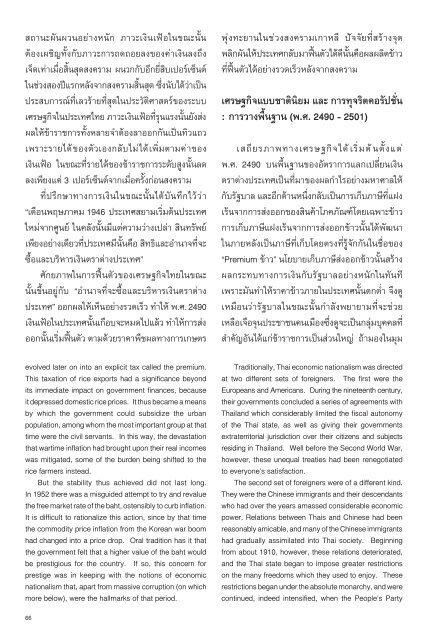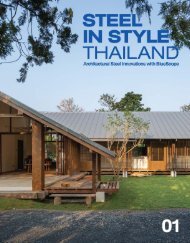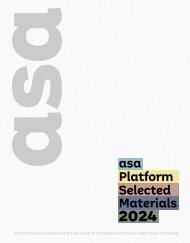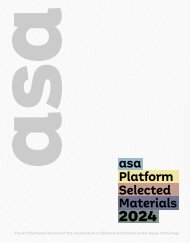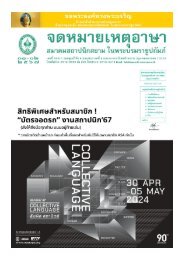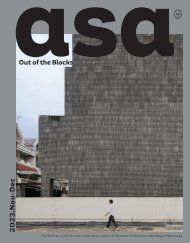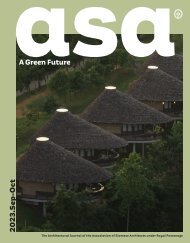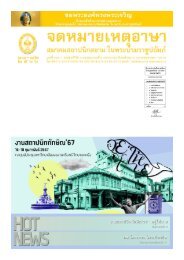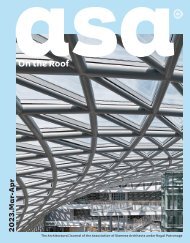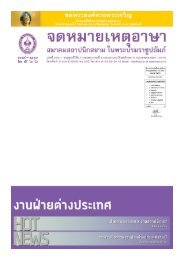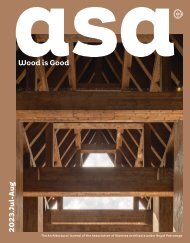บ้านเรือนถิ่นไทยในช่วงเจ็ดทศวรรษ 2489-2559
You also want an ePaper? Increase the reach of your titles
YUMPU automatically turns print PDFs into web optimized ePapers that Google loves.
สถานะผันผวนอย่างหนัก ภาวะเงินเฟ้อในขณะนั้น<br />
ต้องเผชิญทั้งกับภาวะการถดถอยลงของค่าเงินลงถึง<br />
เจ็ดเท่าเมื่อสิ้นสุดสงคราม ผนวกกับอีกยี่สิบเปอร์เซ็นต์<br />
ในช่วงสองปีแรกหลังจากสงครามสิ้นสุด ซึ่งนับได้ว่าเป็น<br />
ประสบการณ์ที่เลวร้ายที่สุดในประวัติศาสตร์ของระบบ<br />
เศรษฐกิจในประเทศไทย ภาวะเงินเฟ้อที่รุนแรงนั้นยังส่ง<br />
ผลให้ข้าราชการทั้งหลายจำต้องลาออกกันเป็นทิวแถว<br />
เพราะรายได้ของตัวเองกลับไม่ได้เพิ่มตามค่าของ<br />
เงินเฟ้อ ในขณะที่รายได้ของข้าราชการระดับสูงนั้นลด<br />
ลงเพียงแค่ 3 เปอร์เซ็นต์จากเมื่อครั้งก่อนสงคราม<br />
ที่ปรึกษาทางการเงินในขณะนั้นได้บันทึกไว้ว่า<br />
“เดือนพฤษภาคม 1946 ประเทศสยามเริ่มต้นประเทศ<br />
ใหม่จากศูนย์ ในคลังนั้นมีแต่ความว่างเปล่า สินทรัพย์<br />
เพียงอย่างเดียวที่ประเทศมีนั้นคือ สิทธิและอำนาจที่จะ<br />
ซื้อและบริหารเงินตราต่างประเทศ”<br />
ศักยภาพในการฟื้นตัวของเศรษฐกิจไทยในขณะ<br />
นั้นขึ้นอยู่กับ “อำนาจที่จะซื้อและบริหารเงินตราต่าง<br />
ประเทศ” ออกผลให้เห็นอย่างรวดเร็ว ทำให้ พ.ศ. 2490<br />
เงินเฟ้อในประเทศนั้นเกือบจะหมดไปแล้ว ทำให้การส่ง<br />
ออกนั้นเริ่มฟื้นตัว ตามด้วยราคาพืชผลทางการเกษตร<br />
evolved later on into an explicit tax called the premium.<br />
This taxation of rice exports had a significance beyond<br />
its immediate impact on government finances, because<br />
it depressed domestic rice prices. It thus became a means<br />
by which the government could subsidize the urban<br />
population, among whom the most important group at that<br />
time were the civil servants. In this way, the devastation<br />
that wartime inflation had brought upon their real incomes<br />
was mitigated, some of the burden being shifted to the<br />
rice farmers instead.<br />
But the stability thus achieved did not last long.<br />
In 1952 there was a misguided attempt to try and revalue<br />
the free market rate of the baht, ostensibly to curb inflation.<br />
It is difficult to rationalize this action, since by that time<br />
the commodity price inflation from the Korean war boom<br />
had changed into a price drop. Oral tradition has it that<br />
the government felt that a higher value of the baht would<br />
be prestigious for the country. If so, this concern for<br />
prestige was in keeping with the notions of economic<br />
nationalism that, apart from massive corruption (on which<br />
more below), were the hallmarks of that period.<br />
66<br />
พุ่งทะยานในช่วงสงครามเกาหลี ปัจจัยที่สร้างจุด<br />
พลิกผันให้ประเทศกลับมาฟื้นตัวได้ดีนั้นคือผลผลิตข้าว<br />
ที่ฟื้นตัวได้อย่างรวดเร็วหลังจากสงคราม<br />
เศรษฐกิจแบบชาตินิยม และ การทุจริตคอรัปชั่น<br />
: การวางพื้นฐาน (พ.ศ. 2490 - 2501)<br />
เสถียรภาพทางเศรษฐกิจได้เริ่มต้นตั้งแต่<br />
พ.ศ. 2490 บนพื้นฐานของอัตราการแลกเปลี่ยนเงิน<br />
ตราต่างประเทศเป็นที่มาของผลกำไรอย่างมหาศาลให้<br />
กับรัฐบาล และอีกด้านหนึ่งกลับเป็นการเก็บภาษีที่แฝง<br />
เร้นจากการส่งออกของสินค้าโภคภัณฑ์โดยเฉพาะข้าว<br />
การเก็บภาษีแฝงเร้นจากการส่งออกข้าวนั้นได้พัฒนา<br />
ในภายหลังเป็นภาษีที่เก็บโดยตรงที่รู้จักกันในชื่อของ<br />
“Premium ข้าว” นโยบายเก็บภาษีส่งออกข้าวนั้นสร้าง<br />
ผลกระทบทางการเงินกับรัฐบาลอย่างหนักในทันที<br />
เพราะมันทำให้ราคาข้าวภายในประเทศนั้นตกต่ำ จึงดู<br />
เหมือนว่ารัฐบาลในขณะนั้นกำลังพยายามที่จะช่วย<br />
เหลือเจือจุนประชาชนคนเมืองซึ่งดูจะเป็นกลุ่มบุคคลที่<br />
สำคัญอันได้แก่ข้าราชการเป็นส่วนใหญ่ ถ้ามองในมุม<br />
Traditionally, Thai economic nationalism was directed<br />
at two different sets of foreigners. The first were the<br />
Europeans and Americans. During the nineteenth century,<br />
their governments concluded a series of agreements with<br />
Thailand which considerably limited the fiscal autonomy<br />
of the Thai state, as well as giving their governments<br />
extraterritorial jurisdiction over their citizens and subjects<br />
residing in Thailand. Well before the Second World War,<br />
however, these unequal treaties had been renegotiated<br />
to everyone’s satisfaction.<br />
The second set of foreigners were of a different kind.<br />
They were the Chinese immigrants and their descendants<br />
who had over the years amassed considerable economic<br />
power. Relations between Thais and Chinese had been<br />
reasonably amicable, and many of the Chinese immigrants<br />
had gradually assimilated into Thai society. Beginning<br />
from about 1910, however, these relations deteriorated,<br />
and the Thai state began to impose greater restrictions<br />
on the many freedoms which they used to enjoy. These<br />
restrictions began under the absolute monarchy, and were<br />
continued, indeed intensified, when the People’s Party


